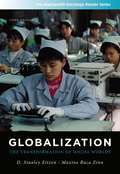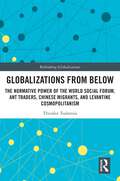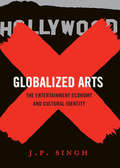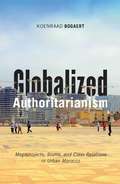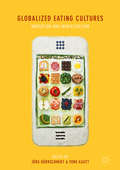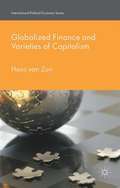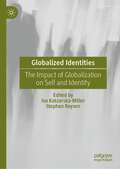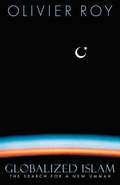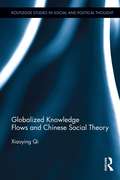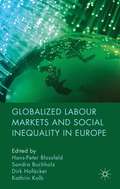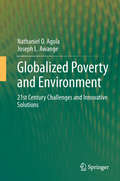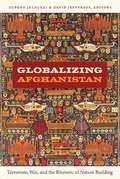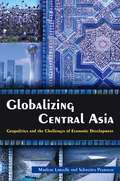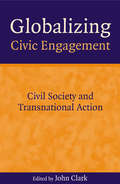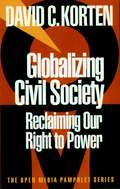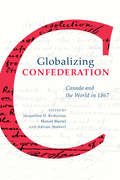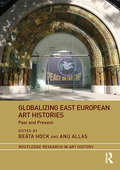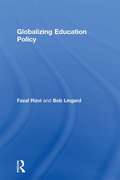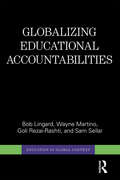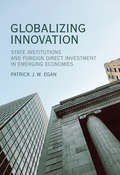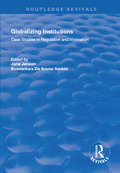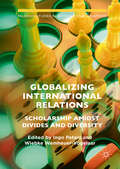- Table View
- List View
Globalization: The Transformation of Social Worlds (Third Edition)
by D. Stanley Eitzen Maxine Baca ZinnThis popular and thought-provoking reader collects interesting and insightful articles that explore the process of globalization and how it shapes societies and groups. The articles, which reflect a wide variety of concerns and perspectives, are drawn from both scholarly and popular sources.
Globalization: What's New
by Michael M. WeinsteinWith original contributions from ten eminent economists, this collection presents diverse and original perspectives on globalization. The contributors analyze recent trends in trade, immigration, and capital flows; why some poor countries have grown while others have stagnated during the past two decades; globalization's impact on jobs and wages in poor countries and in the United States; the surprising environmental benefits of globalization; the degree to which foreign aid helps developing countries; the failures of international institutions to govern the global economy and supporting democracy; and how foreign loans and investments can wreak havoc on a nation's economy.
Globalization: What's New? (Globalization And Community Ser. #54)
by Ed. Weinstein Michael M.From the streets of Seattle to corporate boardrooms to new factories in third-world nations, globalization is subject to very different and often explosively divergent interpretations. Where some see globalization as driving poor countries into further poverty, others see it as the path to economic salvation and democratic rule. With original contributions from ten eminent economists, Globalization: What's New cuts through the confusion and rhetoric to offer straightforward, incisive analysis of globalization and its future.Coming from some of globalization's most prominent supporters (David Dollar), its most vocal critics (Joseph Stiglitz), and those in-between, this collection presents diverse and original perspectives on globalization's immense reach that dig to the core of many debates. The contributors analyze recent trends in trade, immigration, and capital flows; why some poor countries have grown while others have stagnated during the past two decades; future opportunities for low-wage workers; globalization's impact on jobs and wages in poor countries and in the United States; the surprising environmental benefits of globalization; the degree to which foreign aid helps developing countries; the failures of international institutions in governing the global economy and supporting democracy; and how foreign loans and investments can wreak havoc on a nation's economy.
Globalizations from Below: The Normative Power of the World Social Forum, Ant Traders, Chinese Migrants, and Levantine Cosmopolitanism (Rethinking Globalizations)
by Theodor TudoroiuGlobalizations from Below uses a Constructivist International Relations approach that emphasizes the centrality of normative power to analyze and compare the four globalizations ‘from below’. These are: (1) the counter-hegemonic globalization represented by the ‘movement of movements’ of alter-globalization transnational social activists, who try to put an end to the Neoliberal nature of the Western-centered globalization ‘from above;’ (2) the non-hegemonic globalization enacted by ‘ant traders’ that are part of the transnational informal economy; (3) the partially similar Chinese-centered globalization, whose entrepreneurial migrants are strongly influenced and instrumentalized by the Chinese state; and (4) the first wave globalization ‘from below’ that paralleled (and outlived) the 1870–1914 globalization ‘from above.’ This book identifies their common features and uses them to define the concept of globalization ‘from below’ as a set of socio-economic or socio-political processes that involve large transnational flows of people, goods, and/or ideas characterized at least in part by informality. They are enacted by entrepreneurial or activistic individuals who either take advantage of the normative power of the hegemon at the origin of an international order and an associated globalization ‘from above,’ or — explicitly or implicitly — transgress, contest, and try to redefine dominant economic, legal, political, and socio-cultural norms, thus challenging the existing international order and globalization ‘from above.’ By constructing a unified theoretical framework, this book attempts to open a new field of interdisciplinary research that should take globalizations ‘from below’ out of their current scholarly marginality. This is one of the first scholarly works to collectively present more than one globalization ‘from below,’ and will be of great interest to students, scholars, and researchers of International Relations, International Political Economy, Development Studies, Economic History, Anthropology, Diaspora Studies, and Chinese Studies.
Globalized Arts: The Entertainment Economy and Cultural Identity
by J. P. SinghOur interactive world can take a cultural product, such as a Hollywood film, Bollywood song, or Latin American telenovela, and transform it into a source of cultural anxiety. What does this artwork say about the artist or the world she works in? How will these artworks evolve in the global market? Film, music, television, and the performing arts enter the same networks of exchange as other industries, and the anxiety they produce informs a fascinating area of study not only for art and culture but also for global politics. Focusing on the confrontation between global politics and symbolic creative expression, J. P. Singh shows how, by integrating themselves into international markets, entertainment industries give rise to far-reaching cultural anxieties. With examples from Hollywood, Bollywood, French grand opera, Latin American television, West African music, postcolonial literature, and even the Thai sex trade, Singh cites both the attempt to address cultural discomfort and the effort to deny entertainment acts as cultural. He connects creative expression to clashes between national identities, and he details the effect of cultural policies, such as institutional patronage and economic incentives, on the making and incorporation of art into the global market. Ultimately, Singh shows how these issues impact the debates on cultural trade being waged by the World Trade Organization, UNESCO, and the developing world.
Globalized Arts: The Entertainment Economy and Cultural Identity
by J. P. SinghOur interactive world can take a creative product, such as a Hollywood film, Bollywood song, or Latin American telenovela, and transform it into a source of cultural anxiety. What does this artwork say about the artist or the world she works in? How will these artworks evolve in the global market? Film, music, television, and the performing arts enter the same networks of exchange as other industries, and the anxiety they produce informs a fascinating area of study for art, culture, and global politics.Focusing on the confrontation between global politics and symbolic creative expression, J. P. Singh shows how, by integrating themselves into international markets, entertainment industries give rise to far-reaching cultural anxieties and politics. With examples from Hollywood, Bollywood, French grand opera, Latin American television, West African music, postcolonial literature, and even the Thai sex trade, Singh cites not only the attempt to address cultural discomfort but also the effort to deny entertainment acts as cultural. He connects creative expression to clashes between national identities, and he details the effect of cultural policies, such as institutional patronage and economic incentives, on the making and incorporation of art into the global market. Ultimately, Singh shows how these issues affect the debates on cultural trade being waged by the World Trade Organization, UNESCO, and the developing world.
Globalized Authoritarianism: Megaprojects, Slums, and Class Relations in Urban Morocco (Globalization and Community #27)
by Koenraad BogaertA rich investigation into Morocco&’s urban politics Over the past thirty years, Morocco&’s cities have transformed dramatically. To take just one example, Casablanca&’s medina is now obscured behind skyscrapers that are funded by global capital and encouraged by Morocco&’s monarchy, which hopes to transform this city into a regional leader of finance and commerce. Such changes have occurred throughout Morocco. Megaprojects are redesigning the cityscapes of Rabat, Tangiers, and Casablanca, turning the nation&’s urban centers into laboratories of capital accumulation, political dominance, and social control.In Globalized Authoritarianism, Koenraad Bogaert links more abstract questions of government, globalization, and neoliberalism with concrete changes in the city. Bogaert goes deep beneath the surface of Morocco&’s urban prosperity to reveal how neoliberal government and the increased connectivity engendered by global capitalism transformed Morocco&’s leading urban spaces, opening up new sites for capital accumulation, creating enormous class divisions, and enabling new innovations in state authoritarianism. Analyzing these transformations, he argues that economic globalization does not necessarily lead to increased democratization but to authoritarianism with a different face, to a form of authoritarian government that becomes more and more a globalized affair.Showing how Morocco&’s experiences have helped produce new forms of globalization, Bogaert offers a bridge between in-depth issues of Middle Eastern studies and broader questions of power, class, and capital as they continue to evolve in the twenty-first century.
Globalized Eating Cultures: Mediation and Mediatization
by Jörg Dürrschmidt York KauttThis innovative volume explores the link between local and regional eating cultures and their mediatization via transnational TV cooking shows, glocal food advertising and social media transfer of recipes. Pursuing a global and interdisciplinary approach, it brings together research conducted in Latin America, Australia, Africa, Asia and Europe, from leading scholars in sociology and political science, media and cultural studies, as well as anthropology. Drawing on this rich case study material facilitates a revealing and engaging analysis of the connection between the meta-concepts of globalization and mediatization. Across fifteen chapters its authors provide fresh insights into the different impact that food and eating cultures can have on the everyday mediation of ethnicity and class as well as local, regional and transnational modes of belonging in a media rich global environment. This exciting addition to the food studies literature will appeal in particular to students and scholars of sociology, anthropology, media and cultural studies.
Globalized Finance and Varieties of Capitalism (International Political Economy Series)
by Hans ZonHans van Zon analyzes the financialization of developed capitalism, and argues that the emergence of finance as a dominant force has contributed to the relative decline of the West. He demonstrates that the neo-liberal model is inherently unstable and undermines capitalist economies, which can only function if they are embedded in institutions that are non- or even pre-capitalist. He shows how a toxic combination of financialization, corporate globalization, and a deregulated and parasitic financial industry have led to structural economic stagnation in both the USA and the greater part of the EU.
Globalized Identities: The Impact of Globalization on Self and Identity
by Iva Katzarska-Miller Stephen ReysenThis book explores the impact of globalization on self and identity from multidisciplinary perspectives. Chapters cover a variety of topics including the impact of cultural inertia on intergroup relations, global consumer identity, radicalization, evolving national identities, young people’s negotiations of different cultural identities, the emergence of all inclusive global identities, and the impact of global citizenship education on global identity. This collection will be of value to scholars and students from across the social sciences.
Globalized Islam: The Search for a New Ummah
by Olivier RoyCommentary on the Culture and its value.
Globalized Knowledge Flows and Chinese Social Theory: Globalized Knowledge Flows And Chinese Social Theory (Routledge Studies in Social and Political Thought #83)
by Xiaoying QiThis book considers the nature and possibilities of conceptual change and transformation under conditions of globalization, especially with regard to Chinese social and cultural concepts. It argues that the influence of globalization promotes the spread of West European and American social science concepts and methods at the expense of local concepts and approaches, and at the same time (paradoxically) provides opportunities for the incorporation of local concepts, including Chinese concepts, into Western or mainstream social science.
Globalized Labour Markets and Social Inequality in Europe
by Gosta Esping-Andersen Hans-Peter Blossfeld Sandra Buchholz Dirk Hof�cker Kathrin KolbBased on contributions from international experts, this volume provides an up-to-date account of globalization's influences on individual life courses in nine different modern societies, and of cross-nationally varying political strategies to mediate this influence.
Globalized Poverty and Environment
by Joseph L. Awange Nathaniel O. AgolaThis book reviews the key conceptions and economic theories of poverty, explains poverty-environment nexus, and finally offers innovative socio-economic and scientific geospatial solutions for the 21st Century. The book makes it possible for our readers to understand poverty thorough a concise review of the major theoretical economic frameworks, measures of poverty, and points out the need to understand rural-urban dichotomy of poverty. We find the theories and measures to be less-than perfect and therefore point out the need to treat these measures and theories as convenient tools lacking perfect accuracy and utmost scientific reliability. It follows then that the supposedly knowledgeably crafted poverty reduction and environmental preservation solutions are inherently imperfect. The economic solutions proposed in this book transcend extant humdrum macroeconomic and policy measures targeting poverty and environmental issues. We point to a new paradigm in which private sector and other stakeholders can create new and inclusive markets where value is co-created and shared. Above all, this book offers timely state-of-the-art geospatial solutions targeting the most pressing global problems of water, e. g. , the use of the Gravity Recovery and Climate Experiment (GRACE) missions to estimate changes in stored water in the water-poverty-environment nexus, pollution, agriculture and disaster management, where geospatial techniques are applied under strong environmental impact assessment regulatory regimes. This book provides a good summary of economic theories of poverty as well as a vivid depiction of the state of environmental degradation in the world. People often work separately on different issues that are, in fact, closely intertwined. The principle of holism is that the whole is greater than the sum of its parts, and I believe that this joint-venture of two experts on poverty and environment has produced something more than a sum of two separate monographs on the issues. Various points raised in this volume are worth heeding when we think of formulation and implementation of a truly effective post-MDGs development agenda. Yoichi Mine, Professor of Human Security and African Area Study, Graduate School of Global Studies, Doshisha University, Japan
Globalizing Afghanistan: Terrorism, War, and the Rhetoric of Nation Building
by Zubeda Jalalzai David JefferessGlobalizing Afghanistan offers a kaleidoscopic view of Afghanistan and the global networks of power, influence, and representation in which it is immersed. The military and nation-building interventions initiated by the United States in reaction to the events of September 11, 2001, are the background and motivation for this collection, but they are not the immediate subject of the essays. Seeking to understand the events of the past decade in a broad frame, the contributors draw on cultural and postcolonial approaches to provide new insights into this ongoing conflict. They focus on matters such as the implications of Afghanistan's lucrative opium trade, the links between the contemporary Taliban movement and major events in the Islamic world and Central Asia since the early twentieth century, and interactions between transnational feminist organizations and the Afghan women's movement. Several contributors address questions of representation. One looks at portrayals of Afghan women by the U. S. government and Western media and feminists. Another explores the surprisingly prominent role of Iranian filmmaking in the production of a global cinematic discourse about Afghanistan. A Pakistani journalist describes how coverage of Afghanistan by reporters working from Pakistan's Khyber-Pakhtoonkhwa (formerly the North West Frontier Province) has changed over the past decade. This rich panoply of perspectives on Afghanistan concludes with a reflection on how academics might produce meaningful alternative viewpoints on the exercise of American power abroad. Contributors. Gwen Bergner, Maliha Chishti, Cheshmak Farhoumand-Sims, Nigel C. Gibson, Zubeda Jalalzai, David Jefferess, Altaf Ullah Khan, Kamran Rastegar, Rodney J. Steward, Imre Szeman
Globalizing Central Asia: Geopolitics and the Challenges of Economic Development
by Marlene Laruelle Sebastien PeyrouseIn this global era, Central Asia must be understood in both geo-economic and geopolitical terms. The region's natural resources compel the attention of rivalrous great powers and ambitious internal factions. The local regimes are caught between the need for international collaborations to valorize these riches and the need to maintain control over them in the interest of state sovereignty. Russia and China dominate the horizon, with other global players close behind; meanwhile, neighboring countries are fractious and unstable with real potential for contagion.This pathbreaking introduction to Central Asia in contemporary international economic and political context answers the needs of both academic and professional audiences and is suitable for course adoption.
Globalizing Civic Engagement: Civil Society and Transnational Action
by John D Clark'Informative and useful.' Development and Change Until recently, most civil society organizations (CSOs) operated at national or local levels. However, new global organizations and networks are increasingly emerging. This book examines what CSOs can achieve, and the barriers they face, when they break national boundaries and sectoral moulds and work with others in global networks. A series of case studies of CSO initiatives reveal how transnational action can yield impressive results in changing policies and public attitudes. The diverse range of CSOs studied includes consumer groups, trade unions, the anti-globalization protest movement, the World Social Forum, Jubilee 2000 and others. All reveal a remarkably similar array of practical challenges, from structure and leadership issues to governance dilemmas. The book offers practical guidance to those engaged with CSOs and contributes to academic enquiry about civil society.
Globalizing Civil Society: Reclaiming Our Right to Power (Open Media Series)
by David C. KortenPrompted by the 1998 United Nations Conference on Human Settlements, Korten's book indicts the world's governments for failing to address growing hunger, housing shortages, unemployment, poverty, human rights abuses, and environmental degradation. He examines the causes of this global crisis and offers fresh solutions reflecting sustainability, community, and equity--the only principles that can assure a healthy future for the world's people.
Globalizing Confederation: Canada and the World in 1867
by Marcel Martel Jacqueline Krikorian Adrian ShubertGlobalizing Confederation brings together original research from 17 scholars to provide an international perspective on Canada’s Confederation in 1867. In seeking to ascertain how others understood, constructed or considered the changes taking place in British North America, Globalizing Confederation unpacks a range of viewpoints, including those from foreign governments, British colonies, and Indigenous peoples. Exploring perspectives from the Austro-Hungarian Empire, France, Latin America, New Zealand, and the Vatican, among others, as well as considering the impact of Confederation on the rights of Indigenous peoples during this period, the contributors to this collection present how Canada’s Confederation captured the imaginations of people around the world in the 1860s. Globalizing Confederation reveals how some viewed the 1867 changes to Canada as part of a reorganization of the British Empire, while others contextualized it in the literature on colonization more broadly, while still others framed the event as part of a re-alignment or power shift among the Spanish, French and British empires. While many people showed interest in the Confederation debates, others, such as South Africa and the West Indies, expressed little interest in the establishment of Canada until it had profound effects on their corners of the global political landscape.
Globalizing East European Art Histories: Past and Present (Routledge Research in Art History)
by Beáta Hock Anu AllasThis edited collection reassesses East-Central European art by offering transnational perspectives on its regional or national histories, while also inserting the region into contemporary discussions of global issues. Both in popular imagination and, to some degree, scholarly literature, East-Central Europe is persistently imagined as a hermetically isolated cultural landscape. This book restores the diverse ways in which East-Central European art has always been entangled with actors and institutions in the wider world. The contributors engage with empirically anchored and theoretically argued case studies from historical periods representing notable junctures of globalization: the early modern period, the age of Empires, the time of socialist rule and the global Cold War, and the most recent decades of postsocialism understood as a global condition.
Globalizing Education Policy
by Fazal Rizvi Bob LingardRizvi and Lingard's account of the global politics of education is thoughtful, complex and compelling. It is the first really comprehensive discussion and analysis of global trends in education policy, their effects - structural and individual - and resistance to them. In the enormous body of writing on globalisation this book stands out and will become a basic text in education policy courses around the world. - Stephen J Ball, Karl Mannheim Professor of Sociology of Education, Institute of Education, University of London, UK In what ways have the processes of globalization reshaped the educational policy terrain? How might we analyse education policies located within this new terrain, which is at once local, national, regional and global? In Globalizing Education Policy, the authors explore the key global drivers of policy change in education, and suggest that these do not operate in the same way in all nation-states. They examine the transformative effects of globalization on the discursive terrain within which educational policies are developed and enacted, arguing that this terrain is increasingly informed by a range of neo-liberal precepts which have fundamentally changed the ways in which we think about educational governance. They also suggest that whilst in some countries these precepts are resisted, to some extent, they have nonetheless become hegemonic, and provide an overview of some critical issues in educational policy to which this hegemonic view of globalization has given rise, including: devolution and decentralization new forms of governance the balance between public and private funding of education access and equity and the education of girls curriculum particularly with respect to the teaching of English language and technology pedagogies and high stakes testing and the global trade in education. These issues are explored within the context of major shifts in global processes and ideological discourses currently being experienced, and negotiated by all countries. The book also provides an approach to education policy analysis in an age of globalization and will be of interest to those studying globalization and education policy across the social sciences.
Globalizing Educational Accountabilities (Education in Global Context)
by Bob Lingard Wayne Martino Goli Rezai-Rashti Sam SellarGlobalizing Educational Accountabilities analyzes the influence that international and national testing and accountability regimes have on educational policy reform efforts in schooling systems around the world. Tracing the evolution of those regimes, with an emphasis on the OECD’s PISA, it reveals the multiple effects of policy as numbers in countries with different types of government and different education systems. From the effect of Shanghai’s PISA success on nations trying to compete economically to the perverse effects of linking funding to performance targets in Australia, the analysis links testing and accountability to new modes of network governance, new spatialities, and the significance of data infrastructures. This highly illustrative text offers scholars and policy makers a critical policy sociology framework for doing education policy analysis today.
Globalizing Innovation: State Institutions and Foreign Direct Investment in Emerging Economies (The\mit Press Ser.)
by Patrick J.W. EganThe impact of host country institutions and policy on innovation by multinational firms in emerging economies.In the past, multinational firms have looked to developing countries as sources of raw materials, markets, or production efficiencies, but rarely as locations for innovation. Today, however, R&D facilities and other indicators of multinational-linked innovation are becoming more common in emerging economies. In this book, Patrick Egan investigates patterns of inward foreign direct investment (FDI) in developing countries, considering the impact of host country institutions and policy on the innovative activities undertaken by multinational firms. He examines the uneven spread of innovation-intensive foreign direct investment and emerging sectoral distributions, then develops a number of arguments about the determinants of multinational innovation in developing countries. Firms are attracted by a country's supply of skilled labor and are often eager to innovate close to new markets; but, Egan finds, host country institutions and the configuration of the host country's investment policies have a strong impact on firm decisions and evolving country investment profiles.Egan uses econometric analysis to identify determinants of multinational innovation, and examines differences among state institutions as a key variable. He then offers a detailed case study, assessing Ireland's attempts to use foreign direct investment in innovation as a catalyst for development. While FDI is a potential vehicle for industrial upgrading, Egan cautions, it is neither necessary nor sufficient for development. Furthermore, innovation-intensive investments are not likely to develop linkages with local actors or otherwise embed themselves in host economies in the absence of active, discriminating policies channeled through coherent and coordinated institutions.
Globalizing Institutions: Case Studies in Regulation and Innovation
by Jane Jenson Boaventura de SantosThis title was first published in 2000: The contributors to this fully documented volume address the debate surrounding the nature, impact and desirability of the complex set of phenomena collectively referred to as 'globalization'. The book breaks new ground by showing globalization in a wide range of areas, including national and transnational corporations, welfare policies, adoption, gendered politics and democratic institutions, citizenship, religion and judicial systems. It is also a truly international volume, including studies from North and South America, Africa and Europe. The book illustrates how globalization entails localization and is best explored through the analysis of institutions. It will be of particular interest to political scientists, sociologists, lawyers and anyone interested in the continual processes of global change.
Globalizing International Relations
by Ingo Peters Wiebke Wemheuer-VogelaarThis volumes engages with the 'Global(izing)International Relations' debate, which is marked by the emerging tensionsbetween the steadily increasing diversity and persisting dividing lines intoday's International Relations (IR) scholarship. Its international cast ofscholars draw together a diverse set of theoretical and methodologicalapproaches, and a multitude of case studies focusing on IR scholarship inAfrican and Muslim thought, as well as in countries such as China, Iran,Australia, Russia and Southeast Asian and Latin American regions. The followingquestions underpin this study: how is IR practiced beyond the West, and whichtheoretical alternatives are there for Western IR concepts? Fundamentally, whatdivides today's IR scholarship in light of its geo-epistemological diversity?This volume identifies shortcomings in the existing debate and offers newpathways for future research.
